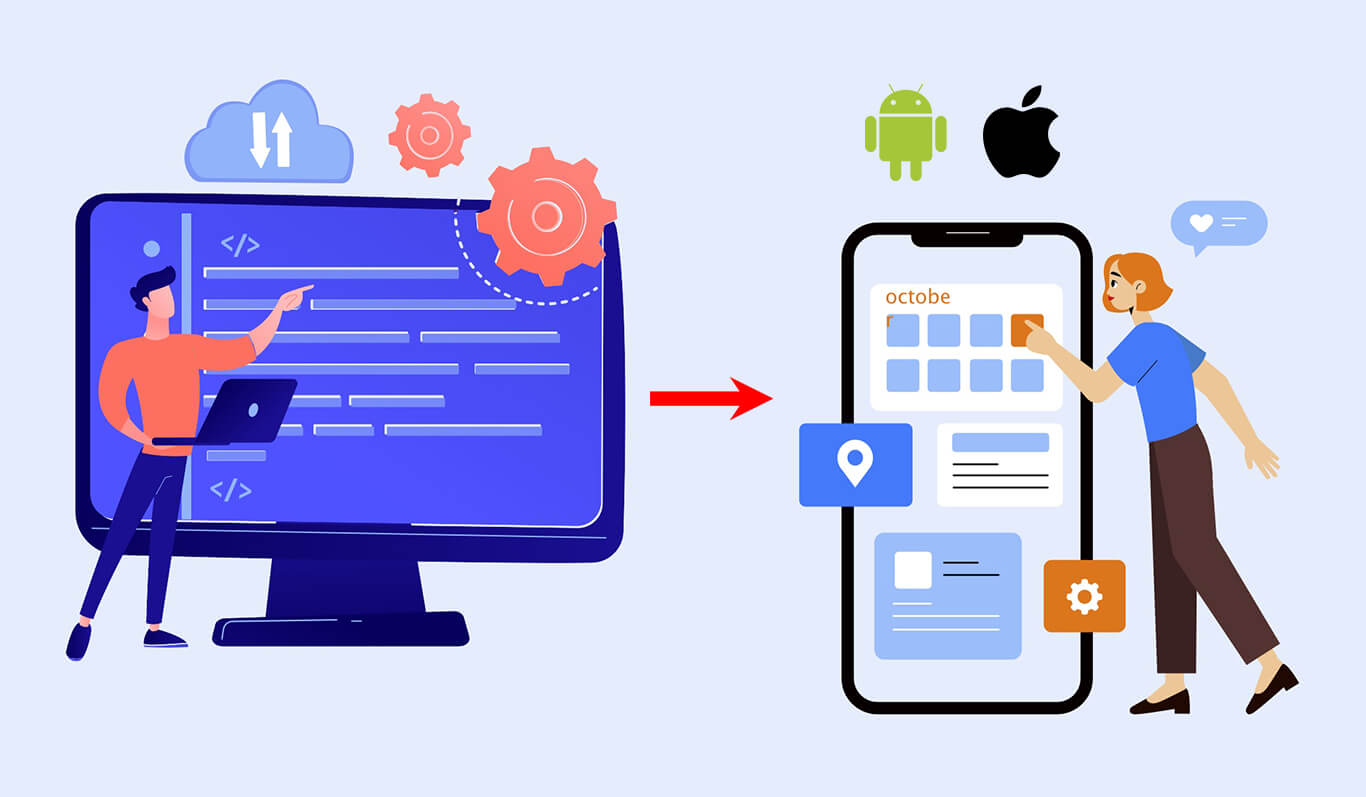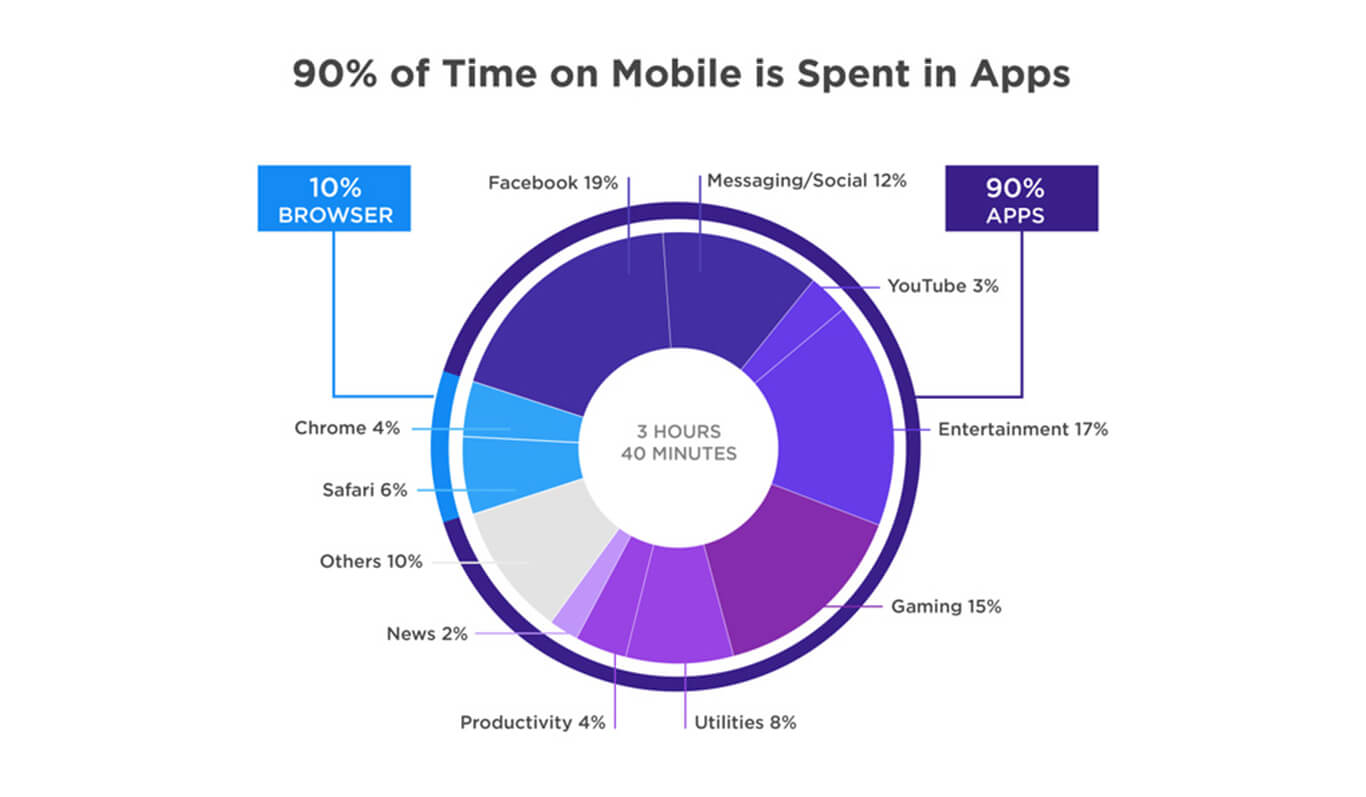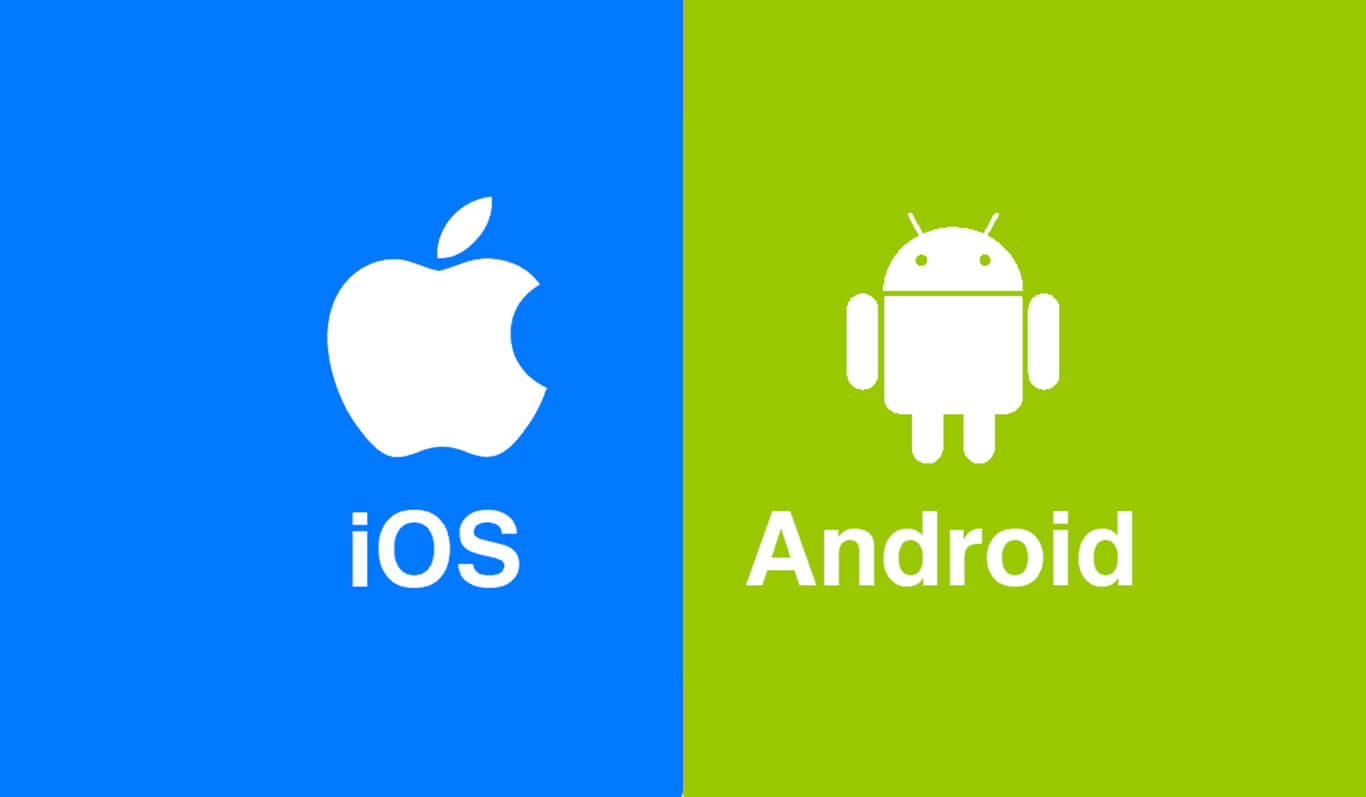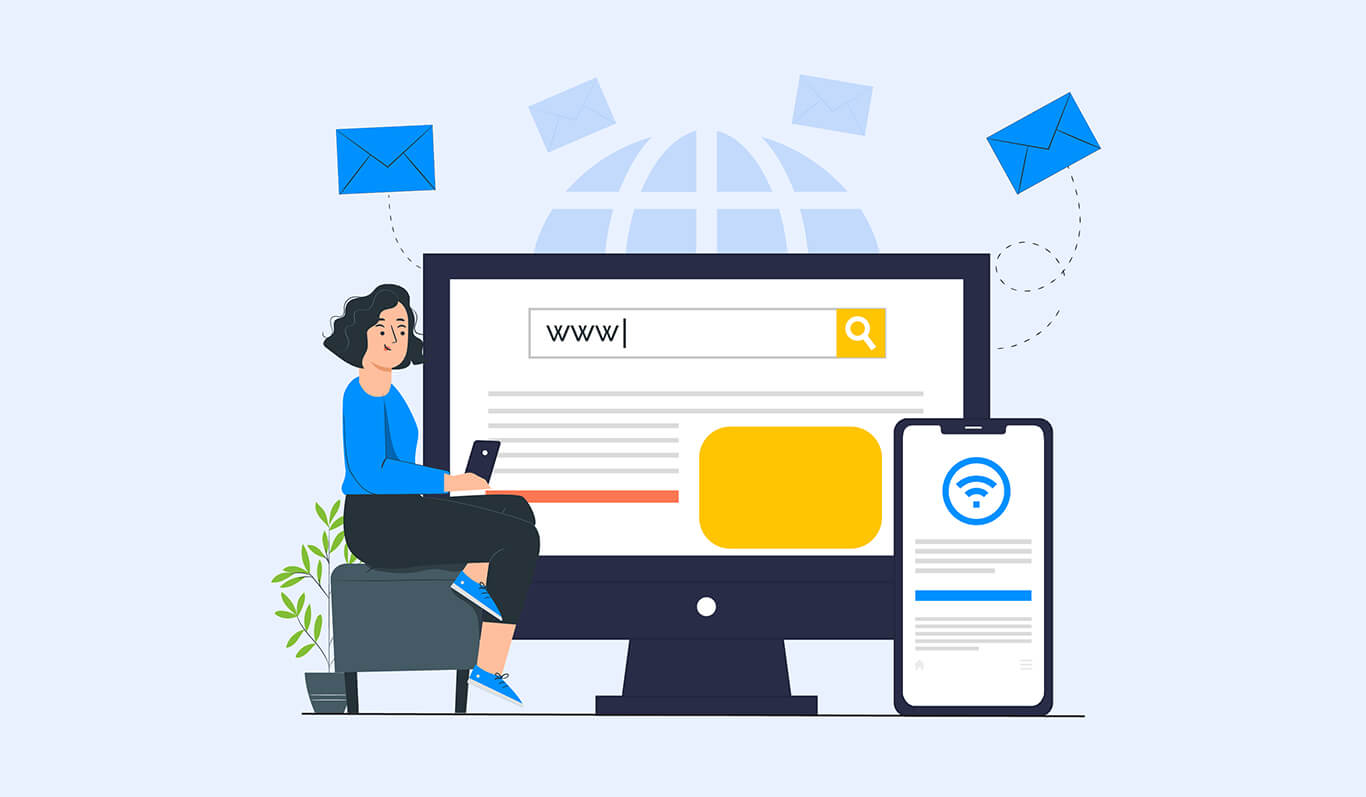How to Convert your Website into an iOS or Android App?
Without a doubt, being digitally visible is your only option if you want to stay in business. Web apps are usually the starting point for businesses looking to offer digital products or services. To be fair, their choice is spot on because developing a web app ensures that your application runs on any device. This consequently leads to a large user base.
But web apps come with limitations. A web app, for example, cannot support mobile-native features, and it has to be always online. Furthermore, under bad Internet conditions, the more complex a website is, the longer the delay will be.
Therefore, a mobile app may be a better option for your business. In recent years, global mobile traffic has increased tenfold, according to Ericsson forecasts. Almost every operation you perform on your smartphone is processed by an app, from selling products online to social networking to tracking your bank account.
Having a stable app for your users would be ideal, and mobile apps can ensure a level of stability that is unparalleled.

Reasons to Convert Your Website into a Mobile App

Modern User Expectations
From desktop browsers to smartphones to mobile apps, technology continues to lead and shape the way the internet influences users’ lives. A huge percentage of our daily lives is spent browsing the contents of various apps on our smartphones. The majority of this time will probably be spent on social media and playing games, but people now expect an app-like experience from any tool, platform, or service that they use on a regular basis. In the case of web apps that are regularly used and solve a specific problem, it is likely that your frequent users will also want an app. Converting your web app to a mobile application though will give you the best of both worlds - a strong web presence and iOS and Android apps for anyone who wants it.
Improve User Experience
It is common for people to expect mobile apps to be available on their smartphones if it is a tool or service they intend to use regularly, in part because these apps provide a better mobile experience. Take a moment to think about how your users access your web app today. For whatever reason, they need to remember your name, open up their browser, enter a URL, wait for everything to load, maybe have to log in, then finally interact with you.
Now, compare this to mobile apps. You can remind them of your app either by showing them an attractive screen icon on their home screen or by sending them a push notification. In just one tap, they'll be in, and the best part is that they won't have to log in every time they use the app. Not only does this remove friction, but it also increases app usage and engagement.
Build Brand Loyalty
It is becoming increasingly important for digital businesses to increase loyalty and retention through apps. Users of apps are more loyal, engage with content more often, and are more likely to return. When a user downloads and installs your app from the app store, they are likely to become lifelong fans. Smartphones are where most consumers spend most of their time with apps, and they may expect brands they purchase from should have an app as well. Like for example, if a person purchases from the Lifestyle store often, having an app for it can help them follow the brand and any new collections that they come out with. For a business, sending a targeted and timely message to a customer increases its chances of turning that customer into a loyal and paying customer. It is easier to do that these days if you use an app that speaks to a well-defined audience, is well-designed, and delivers a great user experience. Like the Lifestyle store example mentioned earlier, if the brand were to send push notifications via its app, it becomes easier for the customer to be aware of the latest offers, trends, etc.
You will eventually come to see that the apps represent your most loyal users. One of the biggest advantages of having them all in one place is the ease of retaining them, especially if the user interface is more appealing this becomes easier to do. A mobile push notification lets you communicate with them directly, while app analytics can help you get a better understanding of their preferences and usage patterns to deliver a personalized experience.
Push Notifications
Users can receive push notifications from mobile apps, which is one of the biggest advantages. It's easy to alert customers about sales, seasonal offers, and more without them having to download and open your app. If the user has enabled push notifications on his or her phone, your alerts appear on the user's lock screen or home screen. This means they can see your messages right away. Apps that run on iOS and Android can take advantage of push notifications to communicate with your users. Any time you wish to share any content with your app users, you can send push notifications to all iOS and Android users. You can target iOS and Android users effectively with push notifications. Unlike emails, they have a higher chance of being viewed, are visible to more people than social media posts, and are more likely to be opened than emails.
You will never be able to send mobile push notifications directly from your web app - but you can do it from a mobile app - and this could greatly improve your marketing efforts.
App Store Presence
It is easy to get users through app stores. As with Google on the web, people use the App Store and Google Play to find solutions to their problems. You need to be visible there as well as on the user's home screen! The app stores are a valuable source of new users who are searching for related keywords. It is probable that users looking for your business would not have found you on the mobile web, but instead, they would have probably found one of your competitors that had apps. You can gain exposure through apps and gain new users at the same time, as well as establish your brand with them. By having apps available on Google Play and the App Store to access, you demonstrate your commitment to mobile user experience - and this may impress potential users, partners, and investors.
Integrations
Having a mobile app for your website also provides you with more access to different features on your phone than a web browser. Depending on your app, you can integrate contacts, browser data, camera functionality, and other smartphone features like GPS, for a more immersive and enjoyable user experience.
Multi-Touch Feature
Apps available on iOS or Android are able to support multi-touch. What this means for the user is that to interact with an app, they can use various gestures like swiping, pinching, and more. With this approach, users get a more engaging, personalized, and habitual experience.
Offline Mode
It is possible for some users to have weak or no internet connections depending on where they live. Mobile apps can work offline, so they are always accessible, unlike websites. Offline features can also be incorporated into your app. In Google Docs, for example, changes are saved on the device and synced with the cloud when the user comes back online.
What are you waiting for? Let's get started! The first thing we need to decide is whether your app will be offered on Android, iOS, or both platforms.
Choosing Between iOS and Android App Development

Android apps and iOS apps make up the majority of the mobile app market. When developing apps for mobile platforms, there is always a comparison between Android apps and iOS apps.
Both platforms are reliable, but choosing between them can be a tedious process. We are simplifying things for you by describing the differences between iOS and Android applications.
There is no clear winner when it comes to comparing Android apps vs iOS apps. With a significant focus on iOS and Android app development services, we as a leading Android and iPhone app development company believe that your choice of platform is strongly influenced by the type of audience you are trying to reach.
Let’s have a look at the benefits of choosing Android or iOS app development for your business.
Android App
Flexible
Using its open-source feature, you can customize your application without having to worry about limitations.
Wide Reach
Mobile platforms such as Android are growing in developing countries such as Africa, Asia, and South America, where they hold a large market share.
Smart Customers
There is no doubt that Android is the winner in terms of geeky users and niche applications.
Design Principles
Google design instructions make it easy for programmers to develop a beautiful User Interface.
Shorter Approval Time
A new application is generally approved by Google Play Store within two days.
iOS App
Rich and Affluent Customers
First-world countries like North America and Europe are usually the target markets for iOS apps and gadgets. Additionally, it enhances monetization opportunities.
Easy Development Process
The simpler development process in iOS enables you to grow more quickly and cost-effectively.
Increased Revenue
E-commerce apps will be a good fit in iOS since iOS users spend three times more than Android users.
Tools For Creativity
The iOS platform is famous for its gaming features, social media features, and novelty elements.
Security
Users' data is shielded from developers and business owners by iOS' comprehensive data shielding system.
The choice between Android apps vs iOS apps development evidently depends on your project requirements, as you might have understood from this comparison. It is therefore important that you decide what your business goals are, what your targeted audience needs, how much time and money will be required, and whether or not there will be any obstacles before beginning a mobile app development project.
You will certainly increase your chances of success if you hire an experienced mobile app development company regardless of what you decide to choose.
How To Convert Your Website into An Android or iOS App?

Create a list of required features for your app
In order to build a successful mobile app, you should first decide what features your app will offer. You can use this to estimate what you need to build and keep your costs in line. Considering all the possible features your app could have is easy to get carried away. You can, however, create an attainable vision for your app by coming up with a reliable list of features. Make sure that every one of them is useful, rather than just flashy.
Hire a development team
Developing a high-quality app requires the expertise of a qualified development team. You can either work with an in-house team or hire the services of an app development company. Out of the two, an in-house team tends to be more expensive. There will be expenses such as rent, hardware, software, taxes, vacations, etc. When you develop your own app, you are able to control the entire development process, allowing you to create a bespoke application that meets your specific requirements.
The cost of outsourcing is generally cheaper because you can hire developers from various places at different rates. However, this means that you cannot supervise every aspect of development and have to trust in the people you have hired.
The solution is to schedule frequent meetings between you and your developers. By doing so, you will be able to stay on track with your project and make changes when necessary. As a result, you won't be handed an app that has little to do with your original blueprint after having waited for weeks or months for it to be completed.
Estimate app development costs
When you have your feature list and development team in place, it's time to calculate the development costs. In general, the more complicated an app is, the more expensive it is to develop. Thinking about mobile app development costs requires weighing a variety of factors.
You will have to specify the type and number of features you want to add, how long it will take to develop the app, who you're working with, and so on. If you're planning to build an app, you should take all of these elements into consideration when it comes to pricing. Reconsider your feature list if over budget and decide which features are essential and which you can add later if you find you are over budget.
Create a user-friendly UX design
UX design is equally important as basic functionality when building your app interface. The point of creating a mobile app is to make it as responsive as your website, after all. It may be better to invest in your website's design than build a brand new app if you cannot make your mobile app more mobile-friendly than your website.
Test your app
Creating an app is similar to developing a landing page, social media post, or email campaign. You have to test it before you publish it to the app store. This way, you can check your app for glitches and flaws before your users discover them.
You will not only save your support team time in resolving customer problems, but you'll also retain users who might have deleted your app after experiencing these issues. Regardless of whether you can fix all the faults before launching your solution, you'll at least be aware of potential problems and can prepare your service team accordingly.
Submit Your App to the App Store
Publishing your app to the App Store is the final step. Neither Apple's App Store nor Android's App Store takes long to review your submission. Both take around three days to review and approve an application. When your app is approved, it should be available in the relevant app store.
Conclusion
People's search patterns for information are changing, so to build a successful website you must adapt your content to match their needs. Developing a mobile app that is easy to use and informative for those searching for your brand on mobile devices is the best way to reach them. Using the steps outlined above, you can create an engaging mobile app for your website and provide customers with an enhanced experience.
FAQs
1. Can a website be converted into a mobile app for Android or iOS platforms?
Yes, of course, it can be done. There are many advantages to converting your website into a mobile app.
- Improved user experience
- Mobile-native features
- Scalability
- Security
- Better user engagement
2. How much does it cost to convert a website into a mobile app?
The cost of converting a website into an Android or iOS app depends on:
- Features of the iOS or Android app
- Location of the development company Reach out to us with your requirements to get a customized quote.
Request a Quote
Categories
Popular posts
Best Practices for Software Product Engineering Every CTO Should Implement
2023-14-18How to Build Your Own On-Demand Carpooling App Services?
2023-08-25How to Start an On-Demand Fuel Delivery Business: A Comprehensive Guide
2023-07-28Empowering Miners: How Fleet Management Apps are Transforming the Mining Industry?
2023-07-21A Complete Guide to Develop a Food Delivery App for Restaurants in 2023
2023-07-08Mobile Apps Transforming the Travel Industry: A Game-Changer in Travel Planning and Experience
2023-07-07
